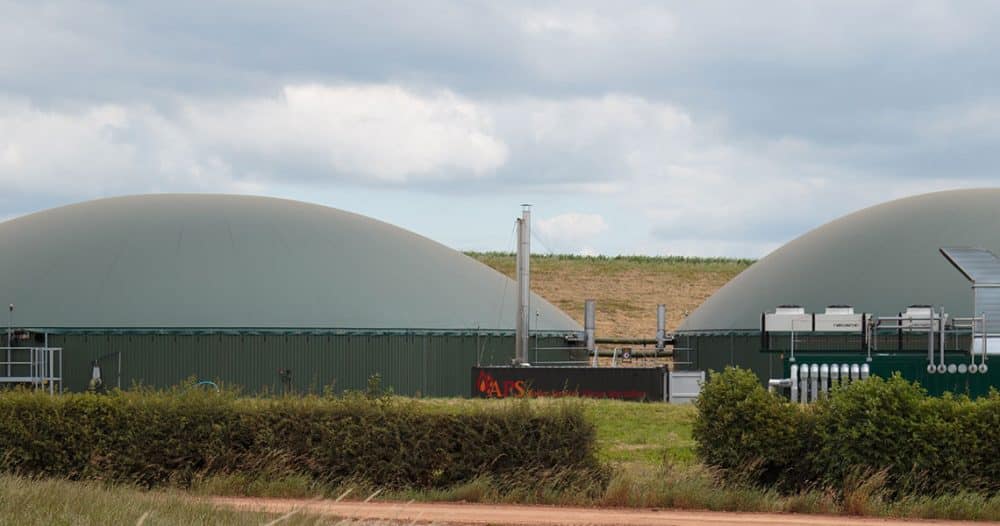Can the UK meet its AD potential?

The UK has almost 730 operational anaerobic digestion (AD) plants, with a capacity of more than 2,800 MW of biogas for use as renewable heat, electricity or biomethane (green gas)¹.
However, we believe that the current deployment of AD in the UK is just a fraction of the country’s total potential.
THE POTENTIAL FOR AD
A report commissioned by Cadent Gas Ltd in 20172 concluded that waste feedstocks had the potential to generate between 47 and 56 TWh of renewable gas (83% BioSNG from gasification and 17% biomethane from anaerobic digestion). From this we can see that the total potential for AD in the UK is around 8 TWh of biogas. Based on these figures, current UK capacity is a tiny fraction of the theoretical maximum.
The Anaerobic Digestion and Bioresources Association (ADBA) also projects that the UK could generate 5.7 billion m³/year of biomethane by 2030, enough to heat 4.5 million homes.³
THE BENEFITS OF BIOGAS
Anaerobic digestion is unique among the main forms of renewable green energy in that it provides other benefits in addition to the provision of low-carbon energy. It offers a sustainable method for the treatment of organic wastes, and in so doing prevents fugitive carbon emissions from the uncontrolled decomposition of such wastes. AD also produces a nutrient-rich, renewable biofertiliser known as digestate, which can help offset agricultural emissions and improve soil health and organic matter.
Biogas and biomethane are uniquely flexible forms of renewable energy. Biogas can be used for heating, or for the generation of electricity via combined heat and power (CHP) units. When upgraded to biomethane, it can be used as a direct replacement for natural gas in the UK gas grid, or as a green transport fuel which is particularly suitable for heavy goods vehicles. These benefits mean that ‘renewable gas can make a significant contribution to meeting 2050 climate change targets, in particular when supporting decarbonisation of the heat and transport sectors, which are currently lagging behind the electricity sector.’²
THE IMPORTANCE OF POLICY
Following the closure of the RHI, the current support for the AD sector comes in the form of the Green Gas Support Scheme, the UK’s first support scheme created specifically for the AD sector.¹ The GGSS has an annual budget of £150 million.
ADBA analysis of the policy ‘indicates that the GGSS has the potential to support the development of 45-50 new biomethane plants, producing around 2.7 TWh per year. However, much like the RHI, support focuses solely on energy generation, and with the scheme’s 50% waste requirement, the development of projects will depend on the ability to source high biogas yielding waste feedstocks – primarily food waste.’¹
THE NEED FOR LEADERSHIP
While the GGSS is welcome it is currently only scheduled to run until 2025, and food waste collection will not be mandated in England until that date. Furthermore, recent political noises about the perceived impact of the costs of various ‘green’ policies and initiatives have created significant uncertainty in the market and among investors.
In short, there appears to be a considerable lack of ambition from government. In contrast, the Climate Change Committee’s (CCC) Sixth Carbon Budget recognises the various roles of AD in meeting the UK’s emmissions targets, in particular its role in tackling emmissions associated with food waste, wastewater treatment and agriculture.
WHAT IS REQUIRED?
The industry needs the right policy support. In particular, there needs to be a ban on all biodegradable wastes being sent to landfill. Furthermore, all wastewater treatment plants should include AD systems, which the CCC believes could reduce such emissions by 21% by 2030. AD also has a key role to play in the treatment of agricultural and food waste, both on farms and in processing factories, and this investment needs to be supported with suitable policies. The use of low emmission technology for the application of digestate also needs to be supported, for example through the Sustainable Farming Incentive (SFI).
In addition, there needs to be more support during the planning and pre-development stages, with local authorities recognising that AD plants can help them meet carbon reduction targets in their region.
THE IMPORTANCE OF EFFICIENCY
Finally, however much policy support is given to the biogas sector, it is imperative that anaerobic digestion plants maximise efficiency at every stage of the process, for both economic and environmental reasons. ADBA clearly believes that there is room to improve the efficiency of AD plants¹, and doing so will require a multi-disciplinary approach including the use of heat regeneration through heat exchangers, as well as the use of bespoke systems such as the HRS BDS (Biogas Dehumidification System), DCS (Digestate Concentration System) and DPS (Digestate Pasteurisation System).
_______________________________________________
¹ ADBA Anaerobic Digestion Policy Report – April 2023
² Review of Bioenergy Potential: Summary Report For Cadent Gas Ltd at https://cadentgas.com/nggdwsdev/media/media/reports/futureofgas/Cadent-Bioenergy-Market-Review-SUMMARY-Report-FINAL-amended.pdf
³ ADBA Biomethane: The Pathway to 2030 at